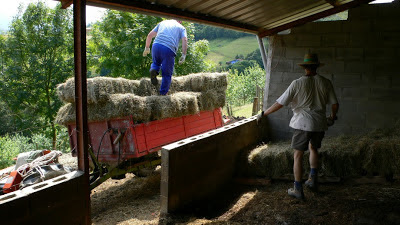 |
|
Raking hay ready
for baling
|
 |
| Moving the straw bales |
 |
|
Stacking the
bales of hay in the stable
|
 |
| Happy sheep and this is when you realise all the work has been worth while |
 |
|
Raking hay ready
for baling
|
 |
| Moving the straw bales |
 |
|
Stacking the
bales of hay in the stable
|
 |
| Happy sheep and this is when you realise all the work has been worth while |
 |
| One of our horses on the farm wanting some fuss |
 |
| New signs on the farm trail |
 |
| One of the hay meadows |
 |
| Heart Flowered Serapias |
 |
| Marbled White butterfly |
 |
| Our Xalda sheep |
 |
| Observing the flowers from the path |
 |
| The chickens waiting for some left overs! |
 |
| Guests investigating the vegetable garden |
 |
| Information on composting |
Xalda mother and lamb
Our flock of Xalda sheep now has about 35 mothers, these are used for keeping the grass down, lamb for the restaurant and wool for Samantha’s felt projects. The Xaldas are a very hardy breed of sheep, rarely giving any problems, except if you need to capture one, when they can run and jump well. This is how they survived in the mountains from predators, such as wolves.
They are different shades of brown and white, which gives nice tones of wool for felting. Many years ago we stopped naming the sheep for obvious reasons, though we do still have one named sheep; Lucky, who fortunately escaped from the fox some years ago.
Max the sheep dog who was with us for 10 years
Sadly we lost Max the sheep dog last year, a very fine well natured Mastin. His replacement is Shiva who is now ten months old, she is slowly bonding to the sheep but as with most young animals is full of life. She is quite big for a female mastin, and very energetic and playful, and slowly doing her job of protecting the sheep.
Shiva the new young female sheep dog
Viboli one of our Asturcon ponies
The ponies we have are Asturcones, the Asturian breed of wild pony, and they are still a little wild. They are called Viboli and Tolivia, time passes but I think they must be about 10 years old. They finish the tough grass the sheep don’t manage to eat, we normally send them to graze after the sheep, and they really can keep the grass down.
The Asturcon ponies with their heavy hoofs
At this time of year they are supplemented with grain. Their heavy hoofs can also help with the battle against mole-rats, apparently it disturbs the underground creatures, and they move on, to another part of the farm……
The hens going round together
The hens which are my delight are wonderful to watch, anyone who likes eggs I think must really appreciate them when you see these birds, busy all day feeding but never getting fat. They are very social able creatures as I think any guest would say, whether it is the company or the thought they might get food that brings them forth I cannot say.
The Asturian breed of chicken
I have different breeds of hens, there are only three Asturian ones which are white and black, the reds which are more common are actually the friendliest and the bantam is the oldest. As with all birds they have an enemy, the hungry fox, just when I am thinking they are safe he strikes again.
The black chickens
Wednesday the goat has now been with us sixteen years, we brought her in the animal market in Cangas when we first arrived here. She is alone in her pen because she doesn’t want company, we did try with some sheep, and we had to grab them quick before she rammed them with her nasty horns. She is like a watchdog; she watches the farm from her privileged plot and calls out if something is amiss. I must admit she is affectionate to me, but I wouldn’t take many people in the pen. It is strange to think Wednesday has seen this project from the beginning and has out lived all the animals that have come and gone during the years.
Wednesday the goat
Cheers to Wednesday
Entrance written by Joe